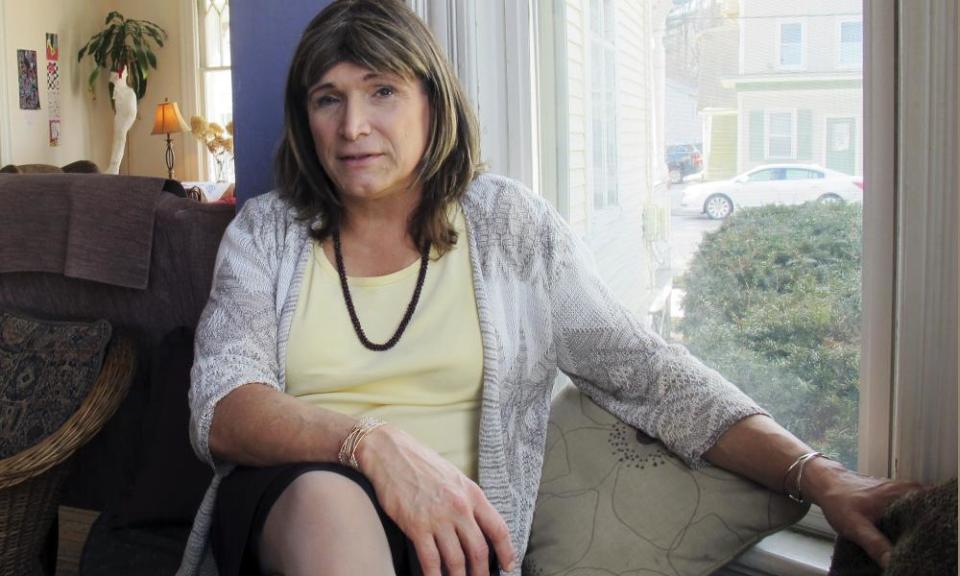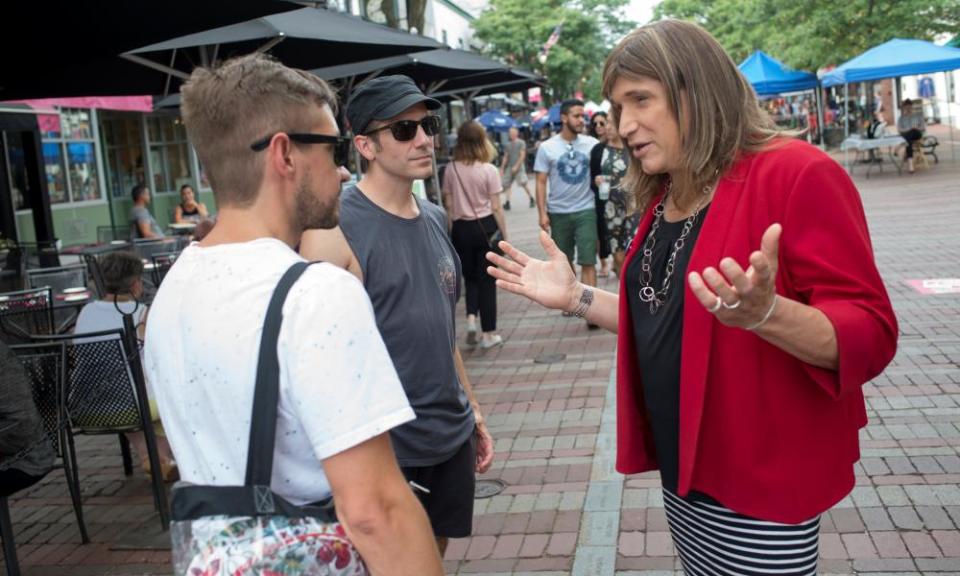Vermont primary could pave way for first transgender governor in US
Christine Hallquist tells the Guardian about running for governor: ‘I tell people this isn’t the hardest thing I ever did. I think after transitioning everything else looks pretty easy’

If Christine Hallquist can win Tuesday’s Democratic primary, and go on to run for Vermont governor, it will be the first time in history that Americans will be able to vote for a transgender woman for such a senior political role.
For Hallquist, it will cap a remarkable journey which has included decades of internal strife over how her family would accept her as Christine, the five-year transition process before she felt ready to present herself as a woman in her job as a high-powered CEO, and even dodging an exorcism attempt as a child.
The Guardian met Hallquist five days before the primary election. That evening, Hallquist would debate her three rivals for the Democratic nomination – the 20th such debate over the past few months. It was her last chance to pitch herself to voters statewide before Tuesday’s vote, but Hallquist was relaxed.
“I tell people this isn’t the hardest thing I ever did. In fact, I think after transitioning everything else looks pretty easy,” Hallquist said.
Including Hallquist, there are four candidates running for the Democratic nomination. The winner will face the incumbent Republican governor, Phil Scott, whose popularity in the state has tanked since the turn of the year.
Sitting in her Burlington campaign headquarters, a stone’s throw from the picturesque Church Street with its bars, restaurants and shops – Hallquist is a jovial, disarming presence. She has not yet acquired the guarded demeanor of a career politician, and a number of times during our conversation she starts an answer by saying: “I shouldn’t say this”, then laughs and says it anyway.
Hallquist, 62, is keen to talk about her vision for Vermont – she wants to provide broadband access across the state, which she believes would aid rural economies, and she is a longtime advocate for environmental energy policies – but has dealt with enough interest at this point to know there will inevitably be questions about being transgender. She said that from a young age she felt she was a girl trapped in a boy’s body.
“When I was 11 years old – I’ll remember this day forever, it’s like a snapshot – the day my mom dressed me as Little Red Riding Hood for Halloween.
“And it was beautiful. I loved it. And I said: ‘Mom, I want to be a girl.’ And she said: ‘Well, never tell anybody that.’

“That’s really all she said, but the way she said it I thought: ‘I’m never going to tell anybody that’.”
At that time it was still possible for people identifying as transgender to be placed in a mental institution, Hallquist said, and she understands her mother’s attempts to protect her.
But though she hid her gender identification, Hallquist was an effeminate child, which didn’t go down well in the Catholic school where she was taught – and says she was regularly beaten – by nuns. Neither did the fact that she had been identified as “gifted” intellectually, Hallquist said, and prone to question certain aspects of the Catholic faith.
“It got so bad that in eighth grade the monsignor [the title given to a senior figure in the Catholic church] called my parents and said we think David [Christine’s name before she transitioned] needs an exorcism,” Hallquist said.
Her parents refused the monsignor’s suggestion and pulled Hallquist, along with her siblings, out of the school. She went to a public school, later gaining a two-year associate degree, before rising through the business world to eventually become CEO of Vermont Electric Cooperative, an electricity company that serves about 34,000 people, mostly in northern Vermont.
Hallquist said she would have been happy to carry on at the company, eventually easing into retirement, but she was inspired to run for governor by the election of Donald Trump.
“November 8, 2016, I realized the world changed,” she said.
“I went to bed, and of course like any other trauma I was in political depression and I just didn’t know what to do. I mean, many of us in this country shed a lot of tears for what happened on November 8.”
On 20 January 2017 Hallquist was among the hundreds of thousands of people who travelled to Washington DC for the Women’s March. Three months later she went back to DC, for the People’s Climate March, and from there began to investigate running for office.
Hallquist is among a small number of transgender people running for office this year. On Saturday, Kim Coco Iwamoto lost her bid to become Hawaii’s next lieutenant governor. Alexandra Chandler is running in the Democratic primary for Massachusetts third congressional district, while former journalist Danica Roem was elected to the Virginia state legislature in November 2017.
Hallquist has been in contact with Roem, receiving guidance and support, while she is also in good company in her choice of campaign headquarters: Bernie Sanders, running for election to the US Senate, has based his own campaign upstairs. The two know each other through Hallquist’s time in the private sector, but she has not had any formal contact with him during her campaign.
Unlike Sanders, she is unwilling to class herself as a democratic socialist, or even as a progressive, despite running on a left-leaning platform which includes a better living wage and Medicare for all.
“I would never class myself as anything,” she said. “Living wage, Medicare for all, why are these progressive policies?”
One of the things Hallquist had braced herself for when she announced her campaign was the level of attention her run would attract. She has had interview requests from numerous international media outlets and believes it has helped with her name recognition back home.
She’s also received a personal boost as supportive messages have flooded in “from around the world”, Hallquist said, some of them from people in a similar situation to hers.
“There have been older people I’ve met, in their 60s or 70s, who have never been able to cross that threshold, who have said they admire my courage,” Hallquist said.
“They’re people who have lived their whole lives with this secret.”
But, predictably, some of the attention has been negative. Some of the worst came after she was interviewed by the UK’s Channel 4 News. More than 200,000 people watched the video on Facebook, and it attracted a slew of “awful” comments, Hallquist said, most of them from men.
It’s something her family had been fearful of. As Hallquist prepared to tell them about her political ambitions she said there were echoes of when she first told her children that she would be becoming Christine – something she had wrestled with for a long time.
“My spouse and I were going to go to the grave with this,” Hallquist said of her being transgender.
“The only reason I did this, really, was because my children didn’t know the truth about me. And of course I started to feel so guilty that I wasn’t going to leave the planet without them knowing the truth.”
With her family now fully supportive, Hallquist is eager for Tuesday’s vote, and has a sense that Vermont, with its democratic socialist senator and progressive history, is the place where a transgender candidate could become governor.
“I gotta believe it’s easier in Vermont,” Hallquist said as we ate dinner on Burlington’s Church Street. “Could we do this in Alabama? Probably not.”

